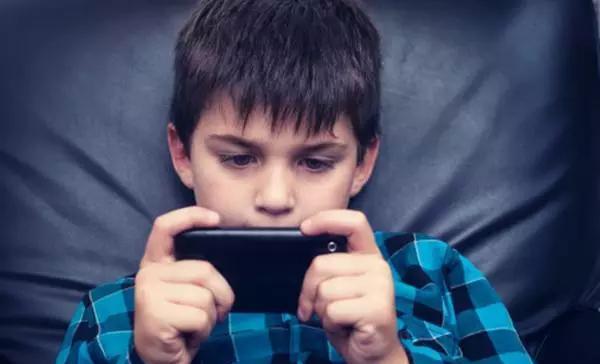In modern life, the popularity of mobile phone television, children lack brothers and sisters, but the places where they can move have also shrunk a lot.
When parents do not have time to manage their children, mobile phones and televisions should naturally become their children's "little partners", effective and safe.
There is a very obvious phenomenon that when the child cries, the toys and delicious food do not work very well, a mobile phone or cartoon, the child immediately does not cry. Over time, TV and mobile phones are more difficult to replace in children's hearts.

Televisions and mobile phones can meet children's sensory stimulation needs, broaden their horizons and increase their knowledge. However, long-term tv, children not only have reduced vision, but also affect visual perception and other learning ability.
Therefore, children who watch TV for a long time will have poor learning ability. Science has long discovered that if a child has too much screen contact, many of his innate abilities will disappear.
1
The three-dimensional ability becomes worse
At the same distance for a long time, the practice experience of three-dimensional sense and depth perception of the eyes will not be enough.
Depth perception cannot accurately determine the distance between itself and the object, so it often collides with people or things.
2
Hand-eye coordination becomes poor
The ability to coordinate vision and body movement, which integrates vision, touch, and motor perception. In schoolwork or sports, eye-to-hand coordination and eye-foot coordination are the most important.
Ball sports with speed can stimulate the child's eyes to chase a lot, so that the child's visual concentration becomes better and the eyes are more flexible.
3
Fine motor skills become worse
Irregular shapes such as building blocks, as well as the size of the volume, through the manipulation of deformation and follow-up, in addition to training concentration, patience and fine motor skills, but also can train the visual perception needed to learn to write at school age.
4
The ability to find things deteriorates
Children's image background perception development is not good, it is easy to find things, the performance of ball activities will be poor, reading will miss words and skip lines, and it will be difficult to learn such as writing text symbols.
5
Interpersonal skills deteriorate
Canadian studies have found that watching too much television naturally crowds out children's time to interact and move with others.
Daily activities, a TV can solve all the entertainment, children with less contact time with their peers, more conducive to interpersonal interaction.
6
Poor language communication skills
Watching TV alone cannot develop the ability to communicate in both directions, children only accept information, and the opportunity to export language is reduced.
If you watch TV before the age of five, by the time you are seven, basic communication with your peers is often not smooth.
7
Poor concentration
Television often presents information in a large number of short clips, fast movements, camera switching, crescendo and fade.
This "rapid succession" of progress and speed undermines children's ability to concentrate, drowning themselves in vast amounts of information, unable to process or think about the information obtained, much less integrate it.
After watching TV for a long time, children's attention ability declines, it is difficult to concentrate in thinking, they become psychologically lazy, and they lack patience and willpower.
What should we do in the face of these problems?
1, appropriate criticism: Psychology believes that it is extremely important to give children appropriate praise and appropriate criticism. However, criticism is not solved by scolding, the best way is to implement "consequence revenge", that is, if children watch too much TV, parents can prohibit or reduce their tv watching, in order to correct their loneliness, non-communication and other character defects.
2, communicate with children more: all at once completely prohibit children from watching TV, which is unwise and impossible. The best thing to do is for parents to watch TV with their children and use this opportunity to communicate with their children. This not only improves the child's appreciation ability, but also enhances the feelings between the two generations, but also provides children with the opportunity to communicate with others and exercise language skills, slowly, children will be more willing to tell parents what they think, so that parents can understand their children and guide their children in a timely manner.
3, play with children: some parents are afraid of children crying to turn on the TV, in order to divert the child's attention, push the child to the TV to "escrow", so that there is an emotional distance between the two generations, which is an irresponsible performance of the child. Therefore, parents should try to take time out of play, walk, and visit parks with their children to provide children with a wide space for activities and make them understand that in addition to television, there are many interesting things in the world.
4, parents first bid farewell to mobile TV: as the saying goes, "the upper beam is not right and the lower beam is crooked", if parents are obsessed with TV every day, it is difficult to imagine that children can withstand temptation. Parents are the first teachers of children, and every word and deed of parents will affect the growth of children, so parents must first "discipline" themselves when disciplining their children.
Parents are the best teachers for children, and if parents only know how to look at mobile phones all day long, children will definitely follow suit. After working with the child to make rules, the adult should also control himself. Read more books, play games with children, let children spend their energy on things other than mobile phones and TVs, and share parent-child time.